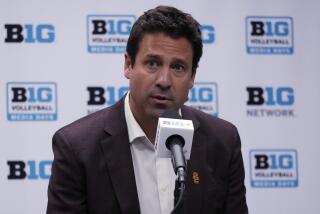U.S. volleyball coach Hugh McCutcheon doesn’t like to look back
- Share via
The question makes Hugh McCutcheon pause. He knew it was coming but, still, he takes a deep breath.
“Yeah,” he says. “Beijing happened.”
The well-respected volleyball coach will soon lead the U.S. women to the 2012 Summer Olympics, where they are favored to win gold. But in looking ahead to London, he must also look back.
Four years ago, McCutcheon was coach of the men’s team at the Beijing Games. Just after the opening ceremony, a knife-wielding man randomly attacked his family at a Chinese tourist site, then committed suicide.
McCutcheon’s father-in-law was killed and his mother-in-law injured. His wife, Elisabeth Bachman, a former national player, witnessed the stabbing.
The incident made international news, the story deepening as McCutcheon returned to coaching a week later and led his team to a surprise gold medal.
Asked about that summer, he leans back and slides a hand over his shaved head. His words, marked by remnants of a native New Zealand accent, remain calm.
“The grieving process, there’s no timeline for that,” he says. “Here was this crummy thing that happened and now we’re back in the same arena again.”
But with a different team and a different setting, McCutcheon isn’t about to dwell on the past. He has other things he would prefer to discuss.
Since volleyball became an Olympic sport in 1964, the American men have won three gold medals while the women have managed only two silvers — one of them in Beijing — and a bronze.
With the women’s team ranked No. 1 in the world, its gold drought could end.
“We’ve earned the right to be confident,” middle blocker Danielle Scott-Arruda said. “But we can’t rest here. It just makes us want to keep fighting.”
Scott-Arruda and her teammates give much of the credit to McCutcheon, a big man with a friendly demeanor and a tactician’s mind.
U.S. officials asked him to switch to the women’s program shortly after Beijing. With bittersweet memories still weighing heavy, he wondered about taking a job that would lead him right back to the Olympics.
“Most of that was driven by not wanting to put the family back in the spotlight, making them re-live any of what happened,” he says. “Going through it once was enough.”
But there weren’t many openings that would allow him to coach on the international scene while living in the U.S. Also, he liked the challenge of working with a team that had something to prove.
On the sideline, McCutcheon can be intense, prowling. Away from the court, he tends to speak in quiet generalities, talking about “maximizing strengths” and “leveraging potential.”
There isn’t much difference between working with men and women, at least not technically, he says. He brought elements of the men’s game — such as movement and blocking techniques — to the women’s program.
But his coaching style needed to change.
“With the men, so much of it is getting through the ego, getting to the core where they are willing to be vulnerable enough to admit they need to make changes,” he says. “With the women, there is a lot of fear and insecurity, so it’s more about validating and helping people build trust so they feel like they belong out there.”
The team has followed an arc reminiscent of what the men experienced on the road to Beijing, improving with each season leading up to the Games.
Training at a site near Disneyland, a massive warehouse that has been converted into volleyball and basketball courts, the women appear to be peaking at the right time.
“Our ability to read the game, to see the game, to link good play after good play is so much better than it used to be,” McCutcheon says. “We can do a lot of different things.”
Still, his team will travel to London carrying the burden of past disappointments and current expectations.
“There is more pressure, but we need to be able to handle that pressure,” setter Lindsey Berg said. “So, if we can’t handle going in as No. 1, we have a big problem.”
The coach has been trying to prepare them mentally, making them focus on details of daily practice and warning them that if they want to take in all the sights and sounds of the Games, “they can go back when they retire.”
One subject that has not come up is Beijing and what happened there. Scott-Arruda, who played with Bachman on previous teams, said: “It was a very tragic moment, but we don’t talk about it now.”
McCutcheon never brings his private life into the gym. The players “understand that I feel very strongly about that separation,” he says. “Maybe that sounds a little bit cut and dried, but it’s always been my coping strategy, just to compartmentalize.”
So, on a recent afternoon, sitting in his office overlooking the practice courts, he talks strategy and seems excited about yet another career switch — in the fall, he will leave the national program to take over as head coach of the women’s team at the University of Minnesota.
His answers regarding Beijing are polite but brief.
Much as he did after the gold-medal victory in Beijing, McCutcheon tries to deflect all the attention to his players. After all, he has a squad that could make history.
“To make it about 2008 just does them a huge disservice,” he says. “We’ve got to look at this group and what they’re doing. That’s the story here.”
twitter.com/LATimesWharton
More to Read
Go beyond the scoreboard
Get the latest on L.A.'s teams in the daily Sports Report newsletter.
You may occasionally receive promotional content from the Los Angeles Times.







